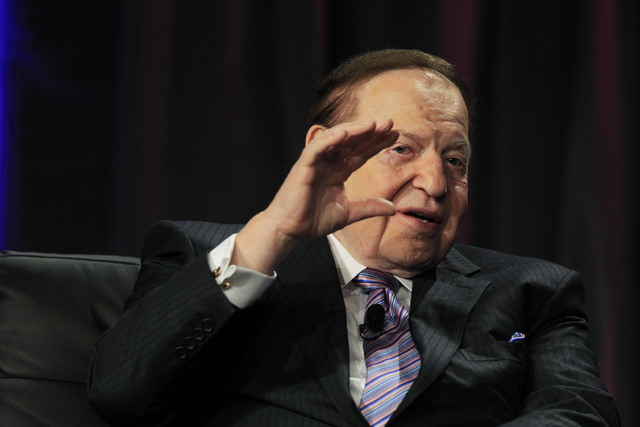Congress may stand pat on Internet gambling

WASHINGTON — An all-out bid by billionaire casino owner Sheldon Adelson to kill gambling over the Internet is coming up empty in the final days of Congress, sources said Monday.
Lawmakers were on the verge of unveiling a $1.1 trillion spending bill to keep the government running through next September. Along with the necessary funding, they were negotiating possible riders affecting government actions on pensions, insurance, transportation, the environment — and online gaming.
Seven sources on Capitol Hill and in the gaming industry said Monday they had knowledge that House Speaker John Boehner, R-Ohio, has turned thumbs down on provisions sought by Adelson to reinstate a policy making it illegal to gamble using Internet technology. Two said they had knowledge Boehner called Adelson personally with his decision.
Officials cautioned anything still could happen during the hectic final days of the post-election lame-duck session that could be completed by the end of this week.
The spending bill “is still open for negotiations so there is always room for shenanigans,” said John Pappas, executive director of the Poker Players Alliance that has lobbied against prohibitions on Web poker.
House leaders “weighed it and it’s unlikely they will do it in lame duck, but we don’t see Adelson stopping pushing this,” said a lobbyist who asked not to be identified.
One reason cited for Boehner’s decision was the pushback last month by a group of Adelson’s fellow conservatives that a federal ban on gambling would be a violation of states’ rights.
House leaders “are not excited to throw something into a lame-duck bill that might incite some rebellion by a faction of the party,” said one source who added a caution: “But weirder things have happened, and until they adjourn, people are going to be pretty vigilant” for possible end runs.
On the last day before Congress adjourned in 2006, a previous bill restricting online gambling, the Unlawful Internet Gambling Enforcement Act, was attached to an unrelated port security measure and became law. The anti-gaming bill “was rammed through Congress by the Republican leadership in the final minutes before the election period recess,” industry analyst I. Nelson Rose wrote in a review.
Spokesmen for Boehner and for Adelson had no immediate confirmation or denial on decisions affecting Internet gambling. The office of Rep. Jason Chaffetz, R-Utah, who sponsored Adelson’s bill, did not respond to a query.
It was not clear when the text of the spending bill would be made public, as issues involving anti-terrorism insurance, multi-employer pension plans and environmental programs remained unresolved Monday.
If Congress punts on Internet gaming, the decision would be a blow to Adelson, who said he was “willing to spend whatever it takes” to defeat gambling on the Internet. Adelson, who has given more than $100 million to Republicans and GOP causes, argued that gambling online is unacceptable from a moral standpoint and a bad business path for the casino industry.
At the same time, it would be a reprieve for Caesars Entertainment, MGM Resorts International and casino companies that up to this year were looking to clarify and expand the legality of Web gaming following a December 2011 Justice Department opinion that federal law on electronic transmission of wagers only applies to sports gambling.
Instead, when Adelson got involved, companies that were looking to expand Web gaming were put on the defensive.
While the chairmen of the House and Senate appropriations committees negotiated the spending levels in the bill, Boehner and Senate Majority Leader Harry Reid, D-Nev., personally handled the policy riders, sources said.
Reid did not comment Monday. He was the subject of widespread speculation that he was allying with Adelson on Web gaming. The two are friendly despite their differing political philosophies, and Adelson is someone with deep pockets who could make life difficult for Reid’s 2016 re-election if he wanted.
Adelson’s bid for a federal prohibition faced a backlash from conservative interest groups including the American Conservative Union, Americans for Tax Reform and the Competitive Enterprise Institute. Leaders of 11 groups signed a letter last month charging a government ban on Internet gambling would violate states’ rights to decide for themselves whether to allow their residents to play poker and other games online.
New Jersey and Delaware are the only states that have legalized online gambling. Nevada has legalized online poker. But other states are considering legalizing poker and other games.
Rep. Frank LoBiondo, R-N.J., began circulating a letter Monday urging Boehner to oppose efforts to restrict online gaming during the lame-duck session “without any debate or open legislative process.” The letter had gained 11 signatures as of Monday evening; no signers were from Nevada.
A planned House Judiciary Committee hearing this month on Internet gambling that would have served as a launching pad for Adelson’s legislation was scrapped as opposition began to emerge. Lobbyists for Adelson continued to meet with aides to Boehner, and also with Reid, in a bid to get something passed in the final days of the session.


















